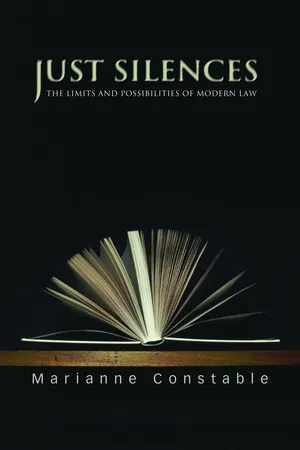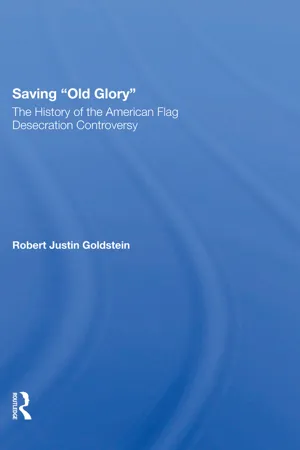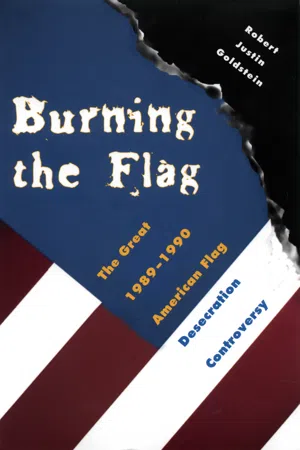Politics & International Relations
Flag Protection Act of 1989
The Flag Protection Act of 1989 was a United States federal law that made it illegal to burn or otherwise desecrate the American flag. The law was struck down by the Supreme Court in 1990, citing it as a violation of the First Amendment's protection of free speech.
Written by Perlego with AI-assistance
Related key terms
Related key terms
1 of 4
Related key terms
1 of 3
3 Key excerpts on "Flag Protection Act of 1989"
- eBook - ePub
Just Silences
The Limits and Possibilities of Modern Law
- Marianne Constable(Author)
- 2009(Publication Date)
- Princeton University Press(Publisher)
14 The act criminalized the conduct of one who “knowingly mutilates, defaces, physically defiles, burns, maintains on the floor or ground, or tramples upon any flag of the United States.”Journalists attributed passage of the Flag Protection Act of 1989 to political tides or political battles, both of which occurred against a background of opinion poll findings and the strategic mustering (or nonmustering) of votes by elected officials. Not only journalists, but also witnesses testifying at congressional hearings on the measures seemed to accept the journalistic description of their position as instrumentally “political.” They spoke, for instance, of proposed measures as attempts to “avoid” the second “prong” of the second part of the Court’s argument or to avoid judicial scrutiny while regulating speech they found offensive.But some critics did suggest that flag protection measures need not be understood as politically instrumental attempts to evade the First Amendment or to change the law declared by or to rein in the power exercised by the Court. As one law professor testified before a House subcommittee, “the Supreme Court has never held . . . that there is a general ‘right to burn the American flag.’” The Supreme Court had found the “flaw” in the Texas statute to be that the statute made “communication of an idea . . . essential to the commission of the crime. The ‘governmental interest’ is thus directly related to the message being communicated,” he claimed. It would still be consistent with the Supreme Court opinion, this witness continued, for “the government [to] prohibit and punish flag-burning—even flag-burning done as part of a political protest—as long as the government has an interest that is unrelated to the message being conveyed.”15 - eBook - ePub
Saving Old Glory
The History Of The American Flag Desecration Controversy
- Robert Justin Goldstein(Author)
- 2019(Publication Date)
- Routledge(Publisher)
protection, as represented by Henderson and alleged selfish political and commercial interests, on a simple lack of patriotism. Thus, the authors of the 1895 pamphlet, clearly addressing government officials, declared, "Your action regarding a bill to protect the national flag from debasing uses is the criterion, the test, of your patriotism. We ask. What are you going to do about it?" In calling for flag desecration legislation in an 1899 petition to Congress, the San Francisco Chamber of Commerce declared that the flag "deserves and should receive the highest respect from all true Americans." Miller entitled his pamphlet of March 5, 1898, calling for such legislation, "An Appeal to Every American in Whose Heart There is One Spark of the Ennobling Fire of Patriotism." In 1899, Brig. Gen. Harrison Gray Otis, the reactionary, powerful editor of the Los Angeles Times, pronounced that the need for flag protection was "so obvious that the question is hardly susceptible of discussion," and former envoy to Ecuador and former GAR department commander Archibald Sampson declared that "it seems only a traitor" would oppose a flag desecration law and that it was "incredible" that any Congressman "should find any pretext" for such behavior. Opponents of flag protection would suffer from the "voice of the people" who would be heard "ere long at the polls," Miller warned in a letter to Senator Hoar. 22 Flag protection movement leaders apparently failed to consider the possibility that federal legislation did not succeed not because of opposition from the unpatriotic, the disloyal, and traitors, or because of internal movement squabbling, but simply because, for a variety of reasons, intelligent people of good will simply may not have been enthusiastic about the idea. However, this explanation is probably the most accurate answer for what admittedly does remain a bit of a puzzle, given the rapid and overwhelming passage of such legislation by the states - eBook - ePub
Burning the Flag
The Great 1989 - 1990 American Flag Desecration Controversy
- Robert Justin Goldstein(Author)
- 1996(Publication Date)
- The Kent State University Press(Publisher)
31Senate Passage of the Flag Protection Act
On September 21, ten days after the House passed the FPA and a week after the SJC completed four days of hearings on the flag controversy, the committee met to make recommendations to the entire Senate. After a heated and often partisan discussion, the committee voted to endorse the original, intact Biden FPA, by a vote of 9–5, and then recommended against passage of the amendment by 8–6.32During the SJC debate, Democratic chairman Biden declared that the Bush amendment did “violence to the First Amendment because it is so broad,” and Republican Hatch argued for it on the grounds that the Supreme Court simply would not “buy off’ on the FPA. Democratic senator Kennedy voiced opposition to either alternative on the grounds that both attempted to “prevent desecration of the flag by desecrating the Constitution” and that freedom of speech required tolerance “for the views that we hate.” His party colleague Senator Metzenbaum argued that only “politics and fear” were driving the flag controversy and that basic freedoms were being “held hostage” by legislators’ fear of “negative advertising spots in the next election.”Following its September 21 meeting, the SJC issued two parallel reports on the FPA and the amendment. The essential argument of the majority was that “the amendment process should be invoked as a last—not as a first—resort” and—citing James Madison—that amendments should be reserved for “great and extraordinary occasions.” They argued that such action was as yet unnecessary because the FPA could both adequately protect the “physical integrity of flag in all circumstances” and withstand Supreme Court scrutiny. Unlike both the Texas law struck down in Johnson
Index pages curate the most relevant extracts from our library of academic textbooks. They’ve been created using an in-house natural language model (NLM), each adding context and meaning to key research topics.
Explore more topic indexes
Explore more topic indexes
1 of 6
Explore more topic indexes
1 of 4


